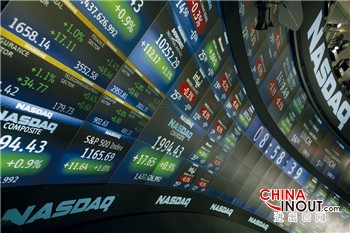美國及全球股市正迎來2011年以來最糟糕的季度表現(xiàn),令投資者恐慌的因素包括中國經(jīng)濟增速放緩,,美聯(lián)儲(Fed)政策的不確定性以及對企業(yè)盈利越來越悲觀,。
令投資者更感不安的是,國際貨幣基金組織(IMF)周二警告稱,,在過去10年盡情借款后,,發(fā)展中世界的企業(yè)倒閉數(shù)量很可能急速攀升。
近年持續(xù)的全球牛市正面臨重大挑戰(zhàn),,除了一些板塊受大宗商品價格暴跌直接影響外,,自7月起許多板塊開始下跌。
標準普爾500(S&P 500)指數(shù)下跌了8.5%,創(chuàng)2011年第三季度以來最大跌幅,。先前飛漲的一些板塊,,尤其是今年早些時候引領(lǐng)市場的生物技術(shù)和醫(yī)療保健板塊,最近幾周顯著下跌,。
標普道瓊斯指數(shù)公司(S&P Dow Jones Indices)資深指數(shù)分析師霍華德纏爾弗布拉特(Howard Silverblatt)表示:“現(xiàn)在的問題在于,,投資者是否已準備好面對2011年以來的第一個下跌之年……以及自2008年的‘糟糕日子’以來最糟糕的年份。”
全球股市也準備迎來2011年以來最糟糕的季度表現(xiàn),,市值蒸發(fā)逾10萬億美元,。富時新興市場指數(shù)(FTSE Emerging markets index)本季度下跌超過21%,為2011年以來最差表現(xiàn),,在21世紀最差季度中排名第五,。
投資者對全球經(jīng)濟增長趨弱的一些跡象越來越感到不安,同時開始質(zhì)疑美國企業(yè)的盈利前景,,全球最大經(jīng)濟體正準備進行近10年來第一次加息,。
大宗商品板塊的持續(xù)下跌加強了投資者對中國需求的擔(dān)憂。截至周二,,追蹤22種大宗商品表現(xiàn)的彭博大宗商品指數(shù)(Bloomberg Commodity Index)第三季度下跌14.8%,,有可能創(chuàng)下自2008年第四季度以來最大季度跌幅。大宗商品全面下跌所涵蓋的商品包括石油,、汽油,、大豆和銅。
在另一份報告中,,標準普爾(Standard & Poor's)警告稱,,美聯(lián)儲加息,中國經(jīng)濟增速放緩,,以及國內(nèi)信貸泡沫解除的組合,,意味著新興市場未來幾年的“前景變得陰暗得多”。(中國進出口網(wǎng))

US and global equities are heading for their worst quarterly showing since 2011, with investors rattled by China’s economic slowdown, uncertainty over Federal Reserve policy and growing pessimism about corporate earnings.
Adding to investors’ unease, the International Monetary Fund on Tuesday warned that corporate failures are likely to jump sharply in the developing world, after a hearty borrowing binge in the past decade.
With an array of sectors slumping since the start of July, beyond those directly influenced by the rout in commodity prices, the global equity bull run of recent years is now facing a major challenge.
The S&P 500 has fallen 8.5 per cent, the biggest decline since the third quarter of 2011. Previously high-flying sectors that led the market earlier this year, notably biotech and healthcare stocks, have fallen appreciably in recent weeks.
“The question now is — are investors ready for the first down year since 2011...and the worst year since the ‘bad days’ of 2008,” said Howard Silverblatt, senior index analyst at S&P Dow Jones Indices.
In turn global stock markets are poised for their worst quarterly showing since 2011, shedding over $10tn in value. The FTSE Emerging Index has tumbled over 21 per cent this quarter, its worst showing since 2011, and the fifth worst quarter this millennium.
Investors have become increasingly unsettled by signs of weakening global growth and are now questioning the earnings outlook for US companies as the world’s largest economy is preparing to raise rates for the first time in nearly a decade.
The continued decline of the commodities sector has reinforced concerns over demand from China. The Bloomberg Commodity Index, a basket of 22 futures contracts, was on Tuesday down 14.8 per cent for the third quarter - setting up potentially the biggest quarterly decline since the fourth quarter of 2008. The broad declines have encompassed commodities including oil, gasoline, soybeans and copper.
In a separate report, Standard & Poor’s warned that the combination of Fed interest rate increases, the Chinese economic slowdown, and the unwinding of domestic credit bubbles meant a “much darker outlook” for emerging markets in the coming years.











